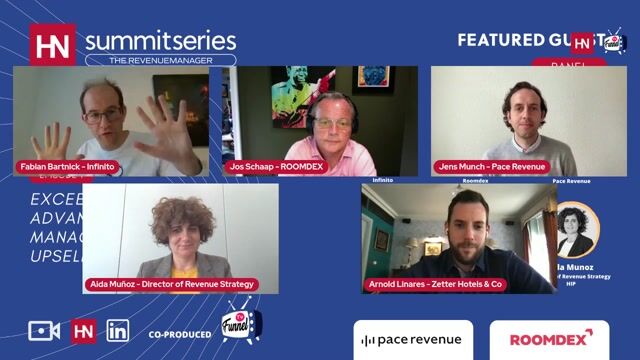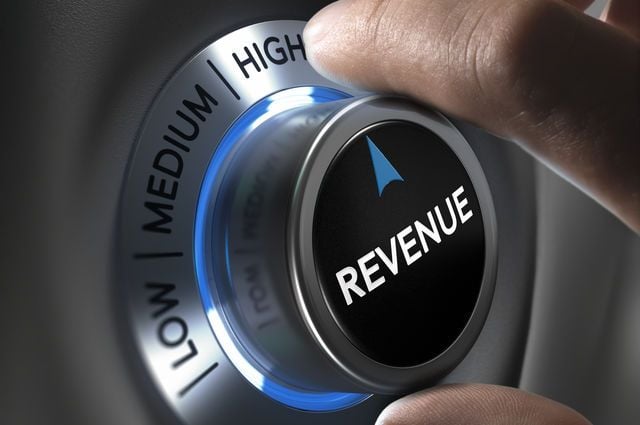Should hotels look to diversify their income streams now?
15 experts shared their view
Expedia Group CEO Peter Kern believes that 2023 will be the year that we stop predicting a travel recovery and actually start enjoying it. In an interview with Bloomberg, he said further: "Summer 2022 will be the busiest travel season ever." But after two years of little to no demand, many hoteliers have started to look beyond traditional room revenue and warmed up to the opportunity which lies in non-room revenue. With a possible record summer ahead, will the idea of total revenue (and total revenue management) remain a focus for the industry or will we revert back to business as (pre-pandemic) usual? So the question is: Should hotels look to diversify their income streams and when is this the right time to do so? What should hoteliers be looking out for in the process and where is the opportunity?
This World Panel Viewpoint is sponsored by:

FLYR (formerly Pace Revenue)
More information

I am a firm believer that a hotel is more than a place for providing temporary sleeping quarters. In the post-pandemic era, it is time to analyze, identify, diversify and maximize the revenue opportunities and adopt a total revenue management strategy and culture at the property.
To begin with, any hotel has numerous untapped, quite often significant revenue opportunities from:
- Core "hotel" ancillary products
- “Non-hotel" ancillary revenues
- Underutilized hotel spaces
- Creating Airbnb-type of product
Why the airlines are a good example to follow?
Hoteliers need to study and copy the airlines' mastery for generating ancillary revenues "out of thin air": in 2019 the airlines' ancillary revenue grew to $64.8 billion from $28.5 billion in 2014. Some airlines like Allegiant Airlines in Las Vegas, Nevada generate as high as 40% of their total revenue from auxiliaries.
How many hoteliers can boast a similar percentage of non-room and non-F&B revenues? How many hotels can boast that 15%, 25% or 35% of their revenue comes from the sale of non-core and ancillary products like this is the case with a typical airline? A hotel has significantly greater ancillary and non-room revenue opportunities than the airlines, yet very few hotels take full advantage of these bottom line enhancing ancillary products.
Why is that? One of the reasons is that many hoteliers are struggling to create the internal processes and systems to successfully sell non-room and ancillary services.
Example: In 2019, the last “normal” year before the pandemic, out of 700 hotels in New York City, only a half dozen offered Broadway theater packages. Why? Too much work, disincentivized employees, and lack of merchandizing strategy.
Generating non-core and ancillary revenues requires a) the implementation of merchandizing strategy and culture at the property/hotel company, b) incentivizing and training your staff, and c) adopting technology solutions to automate as many of the internal processes as possible.
Let's review some of the opportunities hoteliers have to diversify their property revenue:
1. Core Hotel Ancillary Products:
Upsells:
These products are primarily around upselling, upgrading and cross-selling the property's core amenities: better rooms, suites, spa services, F&B (Interested in our Caribbean Buffet tonight?), early check-ins, late check-outs, etc.
Implementing automated solutions like ROOMDEX and Oracle's Nor1 can dramatically increase ancillary revenues, reduce labor cost and enable your staff to focus on delivering exceptional guest services. Another benefit of using technology is that you can upsell during the booking process on your website or call center, via reservation confirmations, during the mobile check-in, and yes, at the front desk or via the self check-in kiosk.
Room self-selection:
For decades now you have been able to select your airline seats, movie theater or opera seats via digital floor plans. I have asked for 20 years now: Why not select your hotel room in advance? Now you can!
Hilton was the first major hotel chain to introduce its Room Selection Capability across its North American properties. Offered exclusive to the Hilton Honors program, members can check-in the day before arrival and select their rooms from a digital floor plan. Members can customize their stay by purchasing a room upgrade (if available) and requesting specific amenities to be delivered to their room before arrival.
Room self-selection offers immense merchandising opportunities: Look for PMS or third-party applications that allow your guests to self-select their room during the mobile or self check-in process from a digital floor plan of your property. The new Oracle Hospitality Integration Hub already offers a similar partner application. Now a similar service is offered to independent hotels by Expect Me, a Belgium-based startup.
Travel consumers are already accustomed to choosing online airline seats, movie theater seats, opera seats, etc., why not hotel rooms? This can be a great way to generate additional revenue: You want a room away from the elevator? It's $10 more. A room on a higher floor? $20 more. Upgrade to a suite for $50? I am convinced room selection will become the norm within the next few years. Enabling advance room selection and mobile keys ad part of mobile and contactless check-in is a great way for reducing your front desk staffing needs by half.
2. Non-Core Hotel Ancillary Products:
Here the sky is the limit! I see two great merchandizing opportunities and here are just a few of them:
- Sale of guest stay-enhancing ancillary products like champagne for special occasions, romantic stay decorations, chocolate covered strawberries, ice cream, bouquet of flowers, breakfast in bed, etc.
- Sale of city passes and tickets to local museums, theme parks, sporting events, concerts and performances, art exhibitions and other attractions, as well as sightseeing tours to places of interest. Better off, selling hotel packages including these local attractions and activities would not only “hide” the room price, but will allow the hotel to sell on value vs sell on rate alone.
3. Maximize Utilization of Hotel Spaces
I see several additional and significant revenue generation initiatives for the utilization of the underutilized hotel spaces:
- Create co-working spaces: Similar to Roger Smith Hotel's KettleSpace Flexible Workspaces, create work-from-hotel spaces for out-of-towners, digital nomads and local entrepreneurs who do not want to be tied down by office leases. Create Room and Office daily, weekly and monthly packages and promotions, including WiFi, coffee, bottled water, snacks and catered lunch.
- Create F&B revenue opportunities in empty and underutilized spaces by installing vending machines, pizza or burger robots. These robots can provide tremendous revenue opportunities for budget, economy and midscale properties without F&B or replace struggling restaurants at upper midscale and other 3- and 4-star properties.
- Vending Machines: We will be witnessing a real resurrection of the vending machine serving breakfast, snacks, hot and cold drinks, naturally in a much more sophisticated reiteration. Marriott is already testing giant vending machines it calls “grab-and-go marketplaces” that can dispense everything from coffee to breakfast sandwiches and cereal.
- Creator, San Francisco's automated burger restaurant, features a 14-foot burger machine with more than 350 sensors that is capable of making 130 premium quality custom burgers an hour, plus a window for takeout orders.
- Piestro, an innovative robotic pizza shop, can deliver high-quality artisanal pizzas within 3 minutes. Their fully-automated machines are being designed with the aim of allowing for zero contact food preparation, zero food waste, consistent quality, and a much lower cost of operation.
- Utilize unused conference/function space: With the corporate group and netting's markets ramping up with a slower pace than leisure travel, utilize unused fu cation space to offer yoga classes, wellness programs, cooking classes, new book readings and author signing events, neighborhood craft shows, etc.
4. Create “Airbnb-type” of product
Short-terms rentals increased their market share during the pandemic and now constitute almost one third of reservations for accommodations in your area. Hoteliers must understand that short-term rental players like AirBnB, Vrbo, Vacasa, etc. are direct competitors and are diverting away at least a portion of their potential guests.
What should hoteliers do?
- Start by monitoring closely Airbnb's, Vrbo's and other vacation rental properties in your market. Research and identify the rental properties in your neighborhood, and what are their typical amenities and features. Ask your BI rate shopping tech vendor to add shirt-term rentals to the set of competitors your are monitoring on a daily basis.
- Identify your property's value proposition and create a list of all of your property's amenities, services and attributes that, in your view, are better than the average vacation rental in your area. Then review and update the property descriptions on the hotel website, social media profiles, CRS and WBE descriptions, directory listings, Google Business Profile, and promotional materials.
- Create a short-term rental type of a hotel product: Introduce weekly and monthly rates for suites with kitchenettes, adjacent rooms to appeal to family travelers; rooms with use of a community kitchen, washers and dryers.
- How many hotels offer rates for extended stays or family stays which are favored by travel consumers in the current environment? Remember, a weekly rate is NOT a daily rate multiplied by seven. A monthly rate is NOT a nightly rate multiplied by 30! Make sure that your CRS, WBE (Website Booking Engine) and Channel Manager can support weekly and monthly rates and fire them if they can't.
- Make sure to educate your staff about the key advantages your property has over the vacation rentals in the area: from better location to no cleaning fees to better cleanliness protocols and really high-speed Wi-Fi and free breakfast.
The moral of the story? Hire and train employees who do not think that diversifying your property revenue is too much work, and you take it from there.
This World Panel Viewpoint is sponsored by:

FLYR (formerly Pace Revenue)
More information




